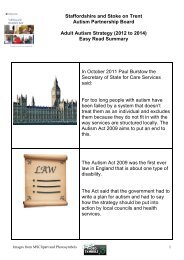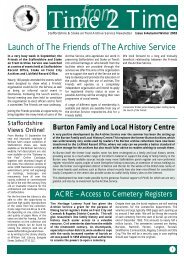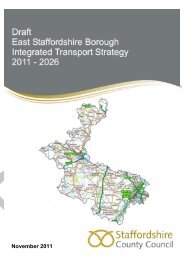nationalCommunitySafetyPlan200811 - Staffordshire County Council
nationalCommunitySafetyPlan200811 - Staffordshire County Council
nationalCommunitySafetyPlan200811 - Staffordshire County Council
Create successful ePaper yourself
Turn your PDF publications into a flip-book with our unique Google optimized e-Paper software.
32 NATIONAL COMMUNITY SAFETY PLAN 2008–11<br />
LOCAL CRIMINAL JUSTICE BOARDS<br />
The 42 LCJBs in England and Wales were established<br />
non-statutorily in 2003 and are based on police force<br />
and criminal justice areas. Membership comprises chief<br />
police offi cers, the CPS, HM Courts Service, the Prison<br />
Service, the Probation Service and youth offending<br />
services. LCJBs are responsible for joining up the CJS<br />
at the local area level, and are increasingly involved in<br />
managing change across the CJS. LCJBs focus on<br />
improving the effectiveness of the CJS by bringing<br />
more offences to justice, reducing the number of<br />
ineffective trials, improving the experience of victims<br />
and witnesses, driving delivery of the timeliness target<br />
in the Persistent Young Offenders Pledge, delivering<br />
the PPO CJS Premium Service, improving enforcement<br />
and increasing public confi dence in the CJS.<br />
There are many overlaps between the agendas of<br />
community safety partnerships and those of LCJBs:<br />
they can work together to reinforce the other’s area<br />
of work. Key areas of common interest are public<br />
confi dence, support and services for victims, and<br />
offender management, including reoffending. Other<br />
areas will be determined by local priorities.<br />
PROBATION TRUSTS<br />
The Offender Management Act 2007 aims to<br />
improve the delivery of probation services to reduce<br />
reoffending and better protect the public. It will<br />
do so by enabling the establishment of probation<br />
trusts (replacing probation boards), and supporting<br />
the commissioning of probation services in greater<br />
partnership with providers in the voluntary, charitable<br />
and private sectors. Commissioning and joint<br />
commissioning will take place at national, regional<br />
and local levels. The national commissioning and<br />
partnership framework will set out NOMS’ priorities<br />
for England and Wales. The national priorities<br />
will fi nd expression in the regional commissioning<br />
and partnership plans, which will also refl ect the<br />
regional reducing reoffending plans developed by the<br />
regional Reducing Reoffending Partnership Boards.<br />
These commissioning plans will be developed in full<br />
consultation with regional and local providers, as well<br />
as sentencers.<br />
CHILDREN’S TRUSTS<br />
Children’s trusts bring together social services, health,<br />
education and other services for children and young<br />
people in a local authority area. Children’s trusts<br />
support the integrated planning, commissioning and<br />
delivery of services, multi-disciplinary working and<br />
clear lines of accountability. This means that children<br />
and young people should experience more integrated<br />
and responsive services and specialist support, resulting<br />
in earlier and more effective support for them and their<br />
families. Children’s trusts have a vital contribution to<br />
make to community safety through their preventative<br />
work, and CDRPs should engage with them to develop<br />
this. Children’s trusts should focus on preventative<br />
work through a multi-agency approach, encouraging<br />
closer joint working between the police, YOTs, youth<br />
services, drug and alcohol services, and health, social<br />
services and educational professionals. The overall<br />
aim should be to intervene at an early stage, before<br />
young people turn to crime and develop drug misuse<br />
problems.<br />
YOUTH OFFENDING TEAMS<br />
YOTs were created by the Crime and Disorder Act<br />
1998. They are local authority youth justice services<br />
that bring together the staff and wider resources of<br />
education, health and social services, the police, the<br />
Probation Service and the third sector. YOTs are<br />
overseen nationally by the YJB, which monitors the<br />
effectiveness of the youth justice system, sets national<br />
standards, shares effective practice and independently<br />
advises the Government on the operation of the youth<br />
justice system. The focus for the YJB and YOTs is to<br />
achieve an integrated, end-to-end youth justice system<br />
that is effectively structured and well equipped to<br />
achieve long-term reductions in youth crime.<br />
LOCAL SAFEGUARDING CHILDREN BOARDS<br />
LSCBs are the most important mechanism for ensuring<br />
that local services consider how they can help to<br />
improve children’s safety, and build this into plans<br />
for their services. LSCBs were established in every<br />
local authority from April 2006 to ensure that local<br />
organisations co-operate to safeguard children and to<br />
promote their welfare, and that the work carried out<br />
is effective.<br />
Some local organisations have to be members of<br />
the LSCB by law – including local authorities, health<br />
services, the Police Service, the Probation Service,<br />
youth justice organisations and Connexions. 7<br />
Other partners – such as schools, further education<br />
institutions, the National Society for the Prevention<br />
of Cruelty to Children, and other voluntary and<br />
community sector bodies – should all be involved in<br />
the LSCB.<br />
7 Connexions is the Government’s support service for all young people aged 13 to 19 in England. It also provides support up to the age of 25 for young people who have learning diffi culties or<br />
disabilities (or both). Through multi-agency working, Connexions provides information, advice, guidance and access to personal development opportunities for young people.

















